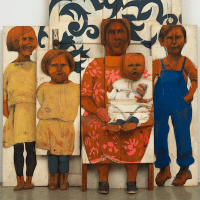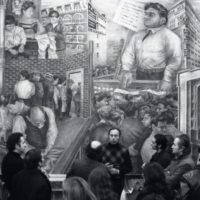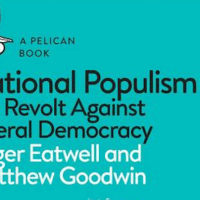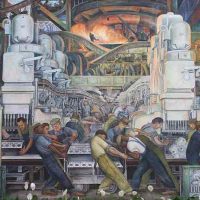-
Europe on the brink of collapse?
The Empire’s European castle of vassals is crumbling. Right in front of our eyes. But Nobody seems to see it. The European Union (EU), the conglomerate of vassals–Trump calls them irrelevant, and he doesn’t care what they think about him, they deserve to be collapsing.
-
Inequality and the ecological transition
Last month Branko Milanovic published a blog post about the Yellow Vest movement against the fuel tax in France. He was worried–like many analysts–that the uprising proves it will be virtually impossible to roll out the policies necessary to reduce carbon emissions. He’s convinced that people simply won’t accept it.
-
War on BDS: How AIPAC-Israel agenda became U.S. priority
The Israeli-U.S. war declared on the Palestinian boycott movement is coming to a head, culminating in a well-orchestrated effort aimed at suffocating any form of tangible protest of the ongoing Israeli colonization of Palestine.
-
My hopes lie shattered
Late last year, U.S. National Security Advisor John Bolton went to Miami (USA), where he coined a new–chilling–phrase: troika of tyranny. It echoed former U.S. President George W. Bush’s phrase, axis of evil. Bush’s axis included Iran, Iraq and North Korea.
-
Why the World Bank’s optimism about global poverty misses the point
The World Bank’s latest annual report on poverty and shared prosperity has an unsurprisingly positive message that only 10% of the world’s population lived in extreme poverty in 2015, which is the most recent year that available data allows for global poverty estimates to be made.
-
Scenes from the UTLA Teachers’ Strike
I don’t remember where I was on September 12, 2012. I was in Chicago, but I wasn’t in the streets when the approximately 26,000 members of the Chicago Teachers Union (CTU) walked out of school and onto the picket lines.
-
Direct Job Creation in America with Steven Attewell
In this episode, we’re joined by Steven Attewell, Adjunct Professor of Public Policy at the City University of New York’s School of Labor and Urban Studies.
-
Are we at a tipping point?
“Liberal democracy is crumbling.” A Harvard Law Professor opened a recent talk with this matter-of-fact statement and the audience readily murmured its assent.
-
The roots of Karl Marx’s anti-Colonialism
Through his relationship with the Chartist radical and labor poet Ernest Jones, Karl Marx came to realize the necessity of opposing slavery and colonialism in ending capitalism.
-
Dossier 12: India’s Communists and the elections of 2019
Ahead of the 2019 elections in India—the largest exercise of electoral democracy in the world–Brinda Karat of the Communist Party of India (Marxist) discusses the current political context in the country and the left-led resistance to the deepening assault on basic human rights led by India’s right-wing.
-
How the U.S. spent Billions to change the outcome of elections around the World
The U.S. military state overthrows democratically-elected governments that it deems to be a threat to corporate interests.
-
The political roots of falling wage growth
It’s now official: workers around the world are falling behind. The International Labor Organization’s (ILO) latest Global Wage Report finds that, excluding China, real (inflation-adjusted) wages grew at an annual rate of just 1.1% in 2017, down from 1.8% in 2016. That is the slowest pace since 2008.
-
Liberals, the populist right & the politics of imperialism
How to respond to the rise of national populism? The phenomenon is evident not only in Trump’s U.S. but throughout Europe, as shown in this book’s comprehensive review of changes in mass opinion. The book also attempts to provide a solution to the problem, one that will defend democracy, but in doing so it inadvertently highlights the bankruptcy of the liberal outlook.
-
Exploitation, Marxism, and Labour Law (Part Two)
The first model is a radical critique of all forms of bourgeois right, including employment rights, which are considered to constitute an ideological reflection of the capitalist mode of production, and therefore an inseparable companion of exploitation.
-
Exploitation, Marxism, and Labour Law (Part One)
On trial with other members of the Rhenish District Committee of Democrats in 1849, Karl Marx argued in a Cologne court that their prosecution was based upon “laws which the Crown itself has trampled into the dirt”.
-
Yellow vest movement is not just about fuel tax hike, it is a crystallization of a deep social discontent and distress
Since November 17, France has been witnessing the massive Gilets jaunes or ‘Yellow Vests’ protests against the anti-working class policies of the Emmanuel Macron government. The protests against the rising economic burden on the people are also spreading to many other European countries.
-
We want cash while waiting for Communism
Susan Ram, who is writing a book on the French Left for LeftWord Books (New Delhi), has a crisp assessment of the yellow vest (gilets jaunes) movement and of its fifth week of demonstration–Act V Macron Démission (Macron Resign). It is anger and determination that defines the yellow vest protest.
-
“A free Palestine from the river to the sea”
It is not uncommon for a mainstream media commentator to be fired for a bigoted or violent comment on air-or off air. As far as I know, there was never a person specifically fired for advocating non-violence and the equal treatment of a group of people.
-
Plan Oder Markt: the battle of ideas between Austro-Marxism and neoliberalism in Vienna
Co-sponsored by SFU’s Institute for the Humanities, School for International Studies, Department of History, & Department of Sociology and Anthropology.
-
Money & Power with Jamee Moudud
In this episode, we’re joined by Jamee Moudud, a professor of economics at Sarah Lawrence College, Jamee draws on the tradition of critical legal studies to extend the constitutional theory of money to new historical and international contexts.



![Activists attend a pro BDS march [Stephen Melkisethian:Flickr]](https://mronline.org/wp-content/uploads/2019/01/Activists-attend-a-pro-BDS-march-Stephen-MelkisethianFlickr-200x200.jpg)
















